
Let’s make Pennsylvania a leader in recycling electronic waste
PennEnvironment outlines our legislative priorities for the 2023-2024 legislative session, as we work to promote clean energy, lower climate pollution, preserve our natural heritage, protect our water, reduce plastic pollution, fight fracking, and more.
Take Action
Executive Director, PennEnvironment
Deputy Director, PennEnvironment
Field Director, PennEnvironment
Zero Waste Advocate, PennEnvironment
Water and Conservation Advocate, PennEnvironment
Clean Air Advocate, PennEnvironment
Pennsylvania is uniquely positioned to tap into the clean energy economy that relies on homegrown renewable energy sources like wind and solar power, and prioritizes energy efficiency and conservation. PennEnvironment supports:
Transitioning to 100% renewable energy: The science is clear—we need to transition Pennsylvania and the nation to 100% clean, renewable energy by 2050 if we’re going to prevent the worst impacts of climate change. Following on the heels of other states, legislation will be introduced to achieve this goal (SB 422 and HB 1740). The General Assembly should move forward with this proposal as quickly as possible.
Renewing Pennsylvania’s renewable energy law: The Alternative Energy Portfolio Standard (AEPS) requires all electricity suppliers in Pennsylvania to get a certain percentage of their energy from wind and solar power, yet the program’s clean energy requirements flatlined in May 2021. Unfortunately, Pennsylvania ranks 50th in the nation for percent growth in total solar, wind and geothermal generation since 2013 despite renewable energy being on the rise nationally. The General Assembly should renew the AEPS and increase the clean energy requirements for solar and wind energy to at least 30% by 2030 in order to reduce climate and air pollution. They can do this by passing SB 230, HB 1467, or similar legislation before the end of the session.
Promoting state efficiency standards: Adopting energy efficiency standards for appliances, light bulbs, and commonly-used household products can have a significant impact on Pennsylvania’s energy and water use, in turn reducing air, water and climate pollution. The General Assembly should enact efficiency standards for appliances, light bulbs, and commonly-used household products (HB 1615 and SB 755).
Helping communities invest in solar: To assist the transition to solar energy, Pennsylvania must increase access to solar energy for all residents. “Community Solar” allows multiple people, homeowners, or businesses to share energy from a single solar project, providing options for those who cannot put solar on their roofs because of physical or financial barriers. The General Assembly should enact Community Solar legislation.
Promoting offshore wind energy: Pennsylvania could make significant headway to bring offshore wind energy to Pennsylvania by allowing for the environmental testing, development and construction of wind projects off the shores of Lake Erie. It is expected that this project could produce enough clean electricity to power hundreds of thousands of Pennsylvania homes and create thousands of important clean energy jobs in the Keystone State. We are calling on legislators to support HB 254.
Making Pennsylvania “Solar Strong”: The General Assembly should create new statewide programs to support Pennsylvania’s family farms and first responders by funding small-scale solar projects. This will help these important constituencies reduce their electricity costs and deal with current economic challenges.
Maximizing the Inflation Reduction Act: This historic federal law includes billions of dollars in clean energy tax credits that can benefit Pennsylvania residents, businesses and nonprofits. State officials should make sure that the commonwealth and its residents are able to take full advantage of these incentives.
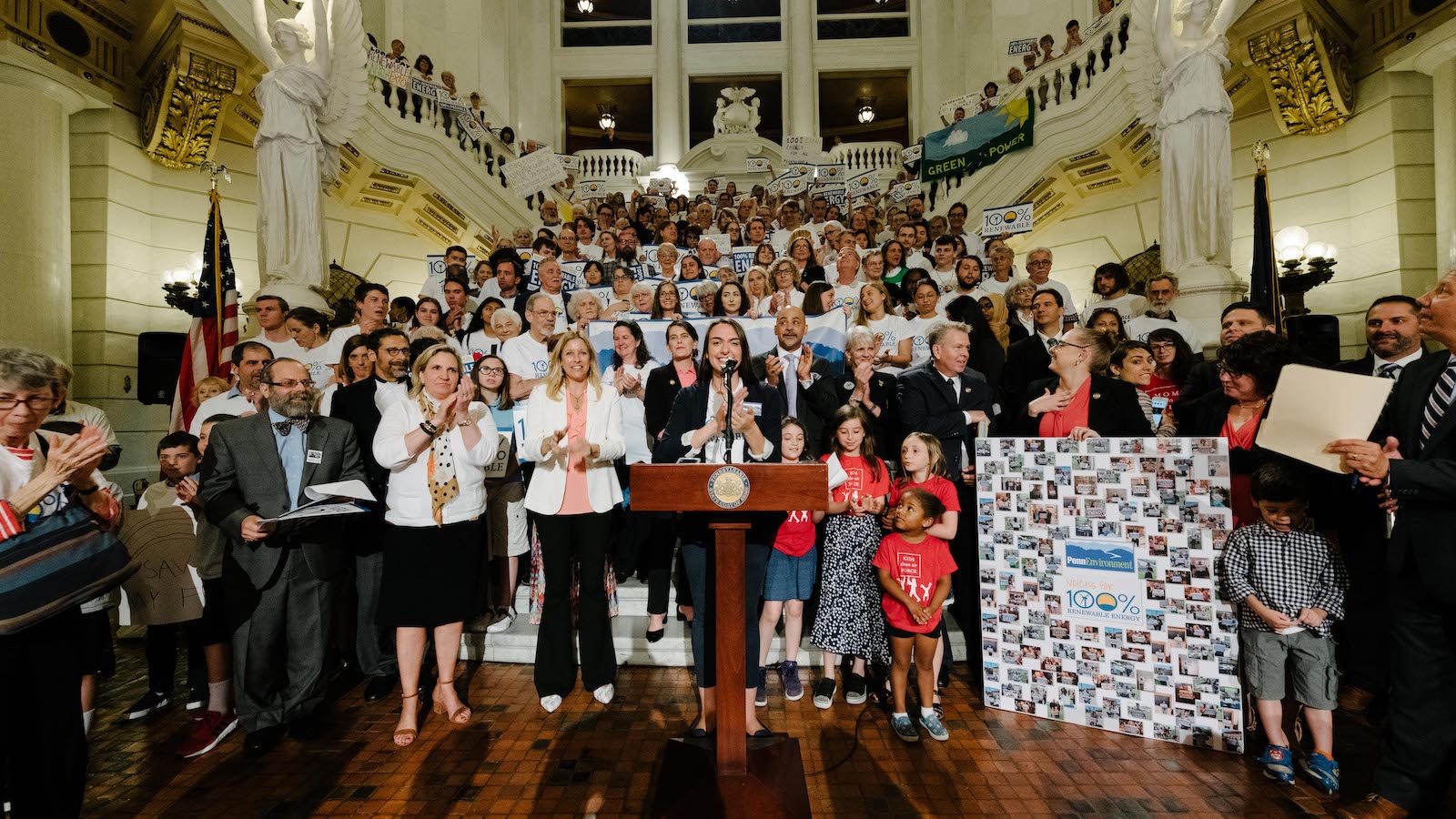
Photo by Garen Meguerian | Used by permission
It’s clearer than ever: we must take concrete, far-reaching steps — and fast — to avoid the worst effects of climate change. That means halting our emissions of greenhouse gasses by 2050. Unfortunately, for far too long Pennsylvania has been part of the climate change problem, currently emitting the fourth highest emissions of global warming pollution in the nation. It’s time to make Pennsylvania part of the solution, and tackle climate change. PennEnvironment supports:
Defending the Regional Greenhouse Gas Initiative (RGGI): Pennsylvania finalized its regulation to join the multi-state climate program RGGI in 2022 in order to reduce the state’s carbon footprint. Legislators should support Pennsylvania’s participation in RGGI and oppose attacks on this and other climate programs. The General Assembly must also work to ensure that revenue raised from RGGI is directed to clean energy projects to significantly reduce climate pollution.
Support electric vehicle infrastructure: HB 1240 has been introduced to promote the construction of electric vehicle charging stations and infrastructure across Pennsylvania. Last session, similar legislation in the Senate (SB435) had broad bipartisan support and was endorsed by businesses, labor unions, environmental groups, and auto manufacturers and dealerships. The legislature should move swiftly to pass this proposal in 2024.
Support Electric School Buses for PA: There is such a great desire from Pennsylvania school districts to purchase electric buses that applications to the U.S. EPA clean school bus program from commonwealth school districts far outpace the amount of money available through the program. Given this, HB 1542 was introduced to help make sure school districts in the Commonwealth have the resources they need to switch to electric school buses. For students who are lucky enough to ride electric buses, that means less exposure to diesel pollution that puts their health and the health of our communities at risk. PennEnvironment hopes the legislature passes HB 1542 before the end of the session.
Oppose onerous fees for electric vehicle owners: Instead of working to incentivize the transition to electric vehicles (EVs), legislation (SB 656) has been proposed to saddle EV owners with onerous fees. Data shows that these additional fees stymie consumer and business purchases of clean EVs, which would hinder Pennsylvania’s ability to reduce climate pollution and our reliance on fossil fuels. The legislature should oppose SB656 and other proposals that will set unfair fees for EV owners in Pennsylvania.
Expand local funding options for public transportation: Pennsylvania’s public transit agencies are facing a funding crisis, which threatens their ability to run effectively. Good public transit is a critical part of a successful 21st Century transportation system. With fewer people in polluting vehicles, we can achieve cleaner air, less climate pollution, and less congestion on the roads. HB 902 and HB 1307 would expand local funding options for public transportation in certain counties, to ensure the viability of these systems and the Pennsylvania residents and businesses that rely on them.
Support electrifying dirty lawn care equipment: Gas-powered leaf blowers and lawn equipment are a significant source of air and climate-warming pollution, with some machines emitting as much pollution as driving from Pennsylvania to Florida–after just one hour of use. Thankfully, electric lawn equipment that is cleaner and quieter is readily available for consumers and lawn care businesses. There will soon be legislation to create a Zero Emissions Lawn Care Task Force charged with developing “a plan to phase out gas-powered lawn and garden equipment in Pennsylvania.” We encourage the legislature to move swiftly to pass it.
Oppose electrification preemption: Legislation (SB 143) is proposed to remove the authority of Pennsylvania cities and towns to implement clean energy policies at the local level. It’s critical to support local clean energy solutions across Pennsylvania — not put up roadblocks to progress. The legislature should oppose this proposal or similar legislation that would hamper local clean energy projects, energy efficiency programs, or electrification initiatives.
Reducing our reliance on dirty, dangerous energy sources: To protect our environment and public health, we must end our reliance on dirty and dangerous forms of energy. The General Assembly should oppose efforts to subsidize fossil fuels and other dirty energy sources, such as the massive petrochemical tax breaks passed in previous legislative sessions or proposals to subsidize or give tax breaks to promote plastics incineration under the guise of “advanced” or “chemical” recycling.
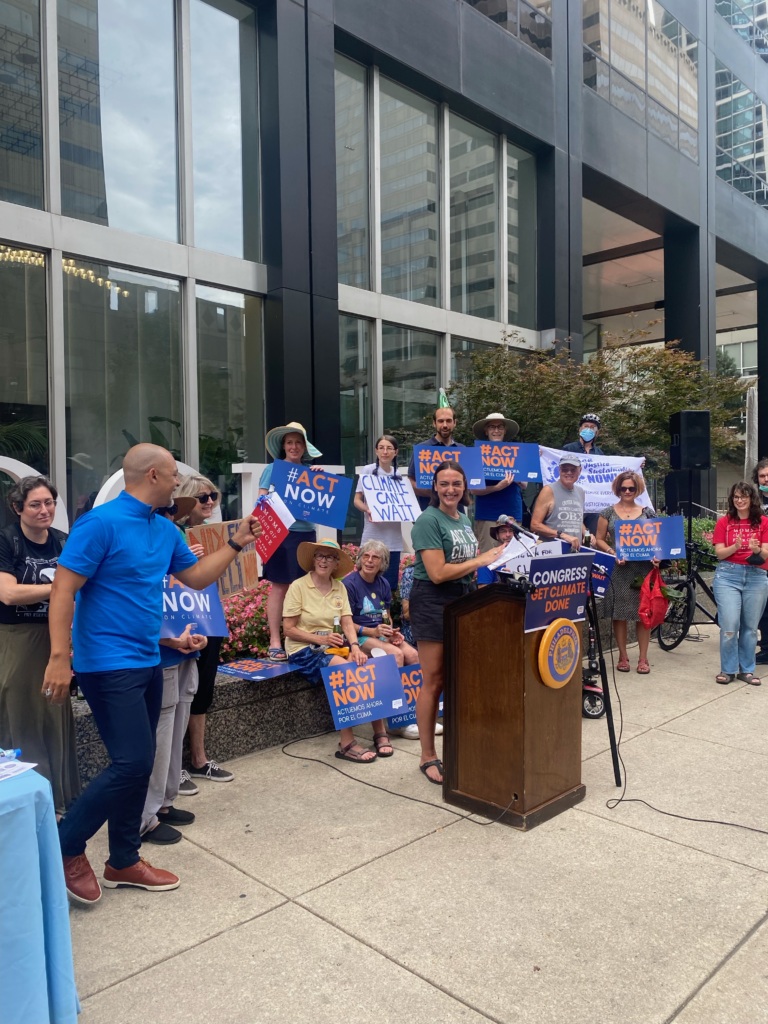
State Rep. Chris Rabb joins PennEnvironment Field Director Flora Cardoni and climate activists to celebrate the climate and clean energy provisions in the Inflation Reduction Act and call for more Climate ActionPhoto by Elowyn Corby | TPIN
From the Delaware Water Gap to Ohiopyle, Pennsylvania is defined by its incredible natural heritage. These outdoor places are a destination for millions of visitors to hike, fish, and camp. Preserving Pennsylvania’s great outdoors must be a top priority for the General Assembly. PennEnvironment supports:
Funding DEP and environmental programs: Since 2003, General Fund support for environmental programs at DEP have been cut by nearly 40%, leading to massive staff layoffs and creating huge constraints on the agency to achieve its mission. The General Assembly should increase DEP funding and make the agency financially whole. At the same time, the legislature should defend cornerstone environmental programs from budget cuts, particularly Growing Greener and the Keystone Fund, and increase funding for the Recycling Fund and Hazardous Site Cleanup Fund (HSCA).
Stop efforts to weaken DEP oversight: Legislation crafted under the guise of “regulatory reform” and introduced in previous sessions will dramatically weaken Pennsylvania’s environmental protections. This package undercuts DEP’s ability to develop and implement needed safeguards, and prevents the agency from effectively holding polluters accountable that violate our laws and threaten the quality of our air and water. The General Assembly should oppose these efforts to weaken our environmental protections.
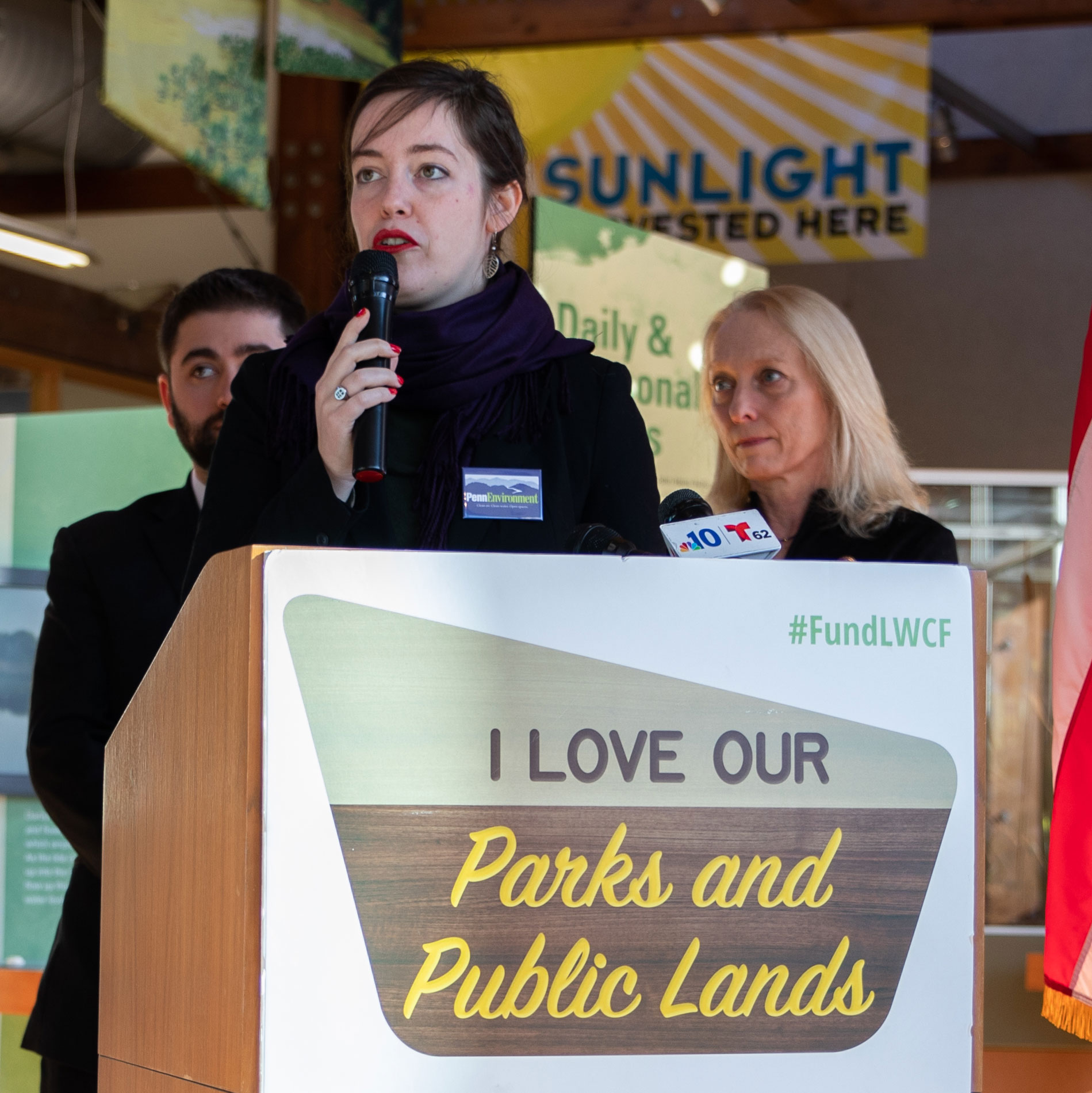
Photo by staff | TPIN
Pennsylvania is blessed to have incredible water resources, from Pittsburgh’s Three Rivers and the Delaware to the streams that crisscross the Commonwealth. They provide incredible recreational opportunities and supply drinking water for nearby communities. It’s critical we protect Pennsylvania’s water resources from stream to tap. PennEnvironment supports:
Getting the lead out of drinking water: After the Flint, Michigan catastrophe, it’s clear that we must take greater steps to protect public health from the threat of lead in our drinking water. The General Assembly should support bipartisan legislation to provide funding and require that all schools in Pennsylvania replace antiquated drinking water fountains with lead-filtering hydration stations in order to fully remove the threat of lead in school drinking water. This is SB 986 in the Senate and the forthcoming “Safe Drinking Water in Schools Act” in the House.
Protecting stream buffer zones: More and more of Pennsylvania’s streams are threatened by pollution and encroaching development. Studies have shown that preserving the forested stream front buffers keeps pollution out of our streams and helps protect communities against flooding. The General Assembly should support legislation to preserve remaining 100-foot stream buffer zones in Pennsylvania, and improve the Exceptional Value (EV) and High Quality (HQ) protection programs for our waterways (HB 1275).
Defending clean water protections: Legislation has been proposed in previous sessions (HB1144) to dramatically weaken clean water protections from oil and gas drilling. This includes eliminating requirements to report many types of oil and fracking brine spills, and allowing fracking wastewater to be applied to unpaved roads as a dust suppressant, and allowing companies that contaminate drinking water with water that doesn’t meet safe drinking water standards. The legislature should oppose this proposal or similar legislation that puts our health and environment at risk.
Protecting the Clean Streams Law: Legislation proposed last session (SB832) would change the definition of water pollution under one of the state’s bedrock clean water safeguards, the Clean Streams Law. This rollback would allow most pollution and spills into our streams and rivers to no longer be defined as “water pollution.” It would also allow polluters to determine if a spill should be reported to the DEP and removes DEP’s authority to require the company to clean up or fix the cause of their spills pollution. The General Assembly should oppose this attack on our clean water protections.

PennEnvironment’s Director David Masur and Congresswoman Mary Gay Scanlon kayak on the Schuylkill River.Photo by Upstream Alliance | Used by permission
There is no “away” in our current throwaway society. Pennsylvanians toss millions of plastic cups, containers, and other single-use plastic items every single day. This pollution clogs our landfills, ends up in incinerators, pollutes our environment, and litters our communities. PennEnvironment supports the Zero Waste PA legislative package, including:
Update Pennsylvania’s electronic waste recycling law: Electronic waste is the fastest growing segment of our waste stream. Yet Pennsylvania’s current laws haven’t effectively addressed the state’s growing e-waste problems. Legislators should support policies to expand and improve electronic waste recycling in Pennsylvania, and ensure we divert this waste from our landfills, incinerators and illegal dumping (HB 1607 and SB 734).
Give consumers the Right to Repair: Consumers and small businesses should have access to the parts, tools and service information needed to repair products, so we can keep things in use and reduce waste. Yet manufacturer barriers exist on everyday products like smartphones, tractors, and life-saving devices like ventilators. The legislature should adopt “right to repair” reforms (SB 744) to allow consumers, small businesses, and more to fix their electronic devices, reduce waste and save money.
Increase support for Pennsylvania’s recycling programs: Waste haulers currently pay $2 per ton of waste going to landfills, which helps fund existing municipal-level recycling programs and gives financial assistance to create new local recycling programs. The $2 fee has remained unchanged since Act 101 was passed in 1988, so the funds have plateaued while the costs of maintaining recycling programs have gone up. In fact, $2 today would only be worth $0.87 in 1988, a fraction of what was originally enacted. Legislation is needed to raise the fee to $5, or $1 for every decade since it was last changed, in order to ensure the success of recycling in the Commonwealth (HB 223 this session).
Giving counties authority to fund recycling: Recycling is a critical tool for addressing our waste issues. But as recycling has become more and more expensive, counties across the Commonwealth are having trouble maintaining their recycling programs. Only 10 out of the 67 counties in Pennsylvania offer curbside collection of recyclables. Before 2005, some counties implemented their own recycling and waste management fees, which were collected from waste haulers, to support recycling programs. Allowing counties to collect a recycling fee of up to $4 per ton of trash (HB 597 this session) would expand and improve recycling programs across the Commonwealth, and help preserve and maintain these vital waste management programs.
Increase penalties for litter and illegal dumping: While most Pennsylvanians and businesses work hard to properly dispose of their waste, littering and illegal dumping are still chronic problems in Pennsylvania, causing significant pollution in our communities and degrading our environment and quality of life. Increasing fines and penalties for citizens caught illegally disposing of their waste (HB 95 this session) could help reduce illegal short dumping, in turn helping to reduce litter and protect our planet.
Eliminate polystyrene waste: The General Assembly should put a statewide ban on one of the most egregious single-use plastics (HB 470): takeout containers and cups made of polystyrene, more commonly known as Styrofoam.
Reduce plastic bag waste: Plastic bags are usually used just once and then they’re thrown away, clogging landfills, creating litter, and polluting our environment. Legislators should support proposals to ban single-use plastic bags statewide and oppose efforts to preempt municipalities from passing local policies to address plastic pollution and waste.
Implement a statewide Bottle Bill: Bottle Bill laws establish a refundable deposit on beverage containers, and are the most successful and cost-effective system to incentivize consumers, retailers and distributors to recycle. They improve recycling rates, reduce litter, help to tackle climate change, create jobs and provide an additional revenue stream for states who implement it. The legislature should pass a statewide Bottle Bill, as well as other “producer responsibility” policies that shift the burden of dealing with waste from consumers to the companies that make the waste in the first place.
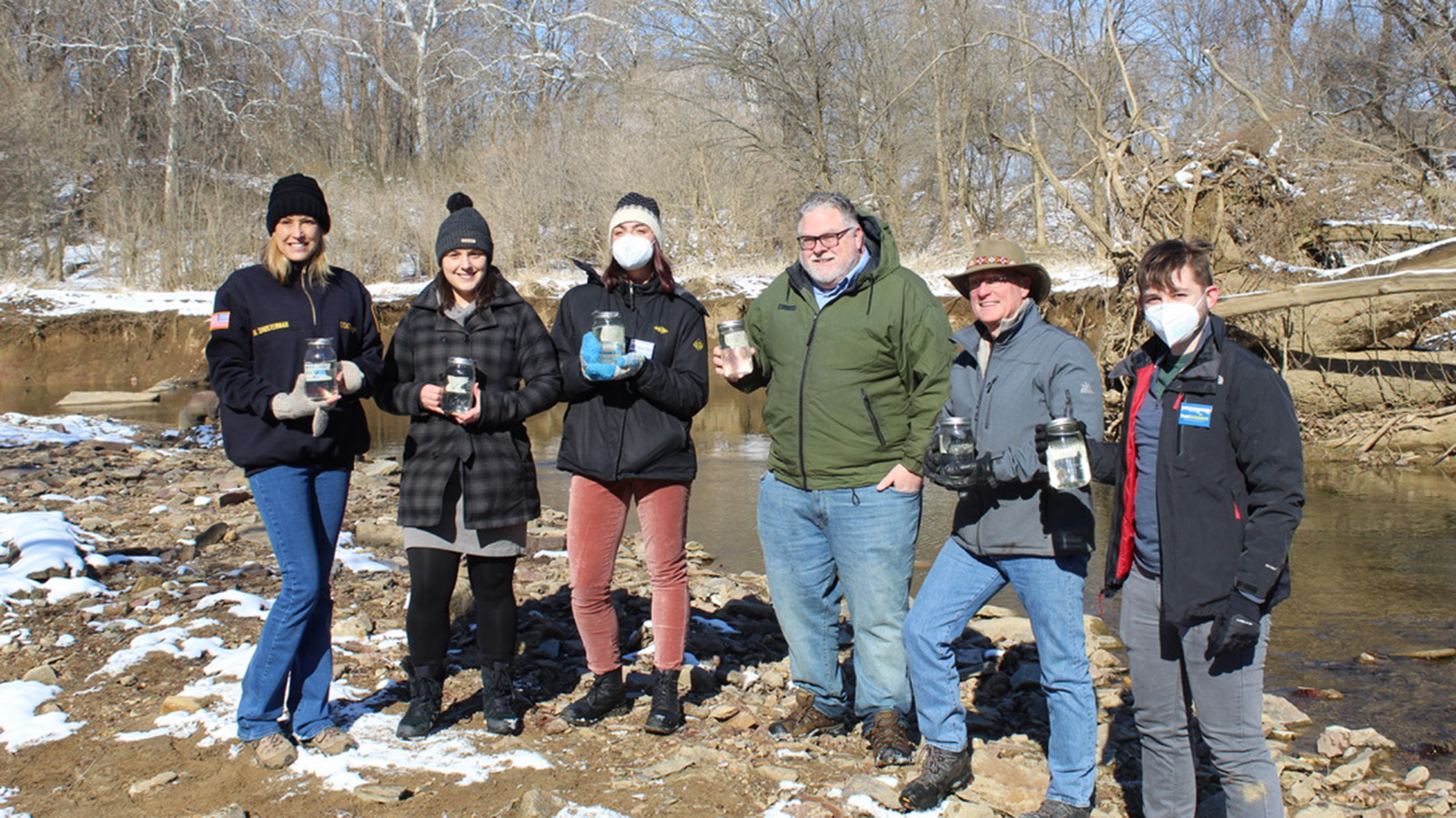
Water sampling for microplastics at Valley Creek in PennsylvaniaPhoto by Rachel Vresilovic | Used by permission
From cradle to grave, fracking poses far-reaching threats to our health, environment and communities. PennEnvironment supports:
Stop dangerous underground injection of toxic waste: Fracking companies are taking wastewater that’s potentially contaminated with toxic chemicals and radioactive material and pumping it into wells and old mining tunnels under communities across Pennsylvania. This jeopardizes public drinking water supplies and puts public health at grave risk. Ohio suspended similar wells in 2023 after finding evidence of fracking fluid traveling more than a mile from the well. It’s time to end the dangerous practice of injecting hazardous, radioactive fracking waste under our communities (HB 1656).
Enact the 2020 grand jury recommendations on fracking: In 2020, a Pennsylvania grand jury released a scathing study about the health and environmental risks posed by fracking. The report offered a series of commonsense recommendations to reduce these threats, including increasing setbacks from oil and gas drilling from homes, schools, hospitals and businesses (HB 170); requiring oil and gas companies to report the chemicals they use in the fracking process (HB 477); strengthening air pollution protections at fracking sites; and studying fracking’s effects on public health (HB 175). The legislature should pass these much-needed health protections as quickly as possible.
Keeping radioactive fracking waste out of drinking water: Radioactive wastewater from fracking is being dumped at landfills and sent into public water supplies. This waste includes dangerous forms of radiation that are unregulated, untreatable by municipal water systems, and often not even tested for. Lawmakers must close loopholes that are allowing this dangerous risk to our drinking water (SB 26 and SB 92) and should ensure municipal water authorities aren’t receiving waste they aren’t equipped to treat (HB 1732).
Protect PA’s great outdoor places from fracking: Pennsylvania is blessed with incredible places that define our commonwealth’s natural heritage. Unfortunately, oil and gas companies are pushing to exploit these great places and important public lands for drilling and fracking. Legislators should oppose any proposals to open up our state parks and forests to fracking (HB 55) and attempts to allow fracking in the Delaware River region (HB2451 in the last session).
Ban fracking: The only way to fully protect Pennsylvanians from the toxic scourge of fracking is to ban the process entirely.
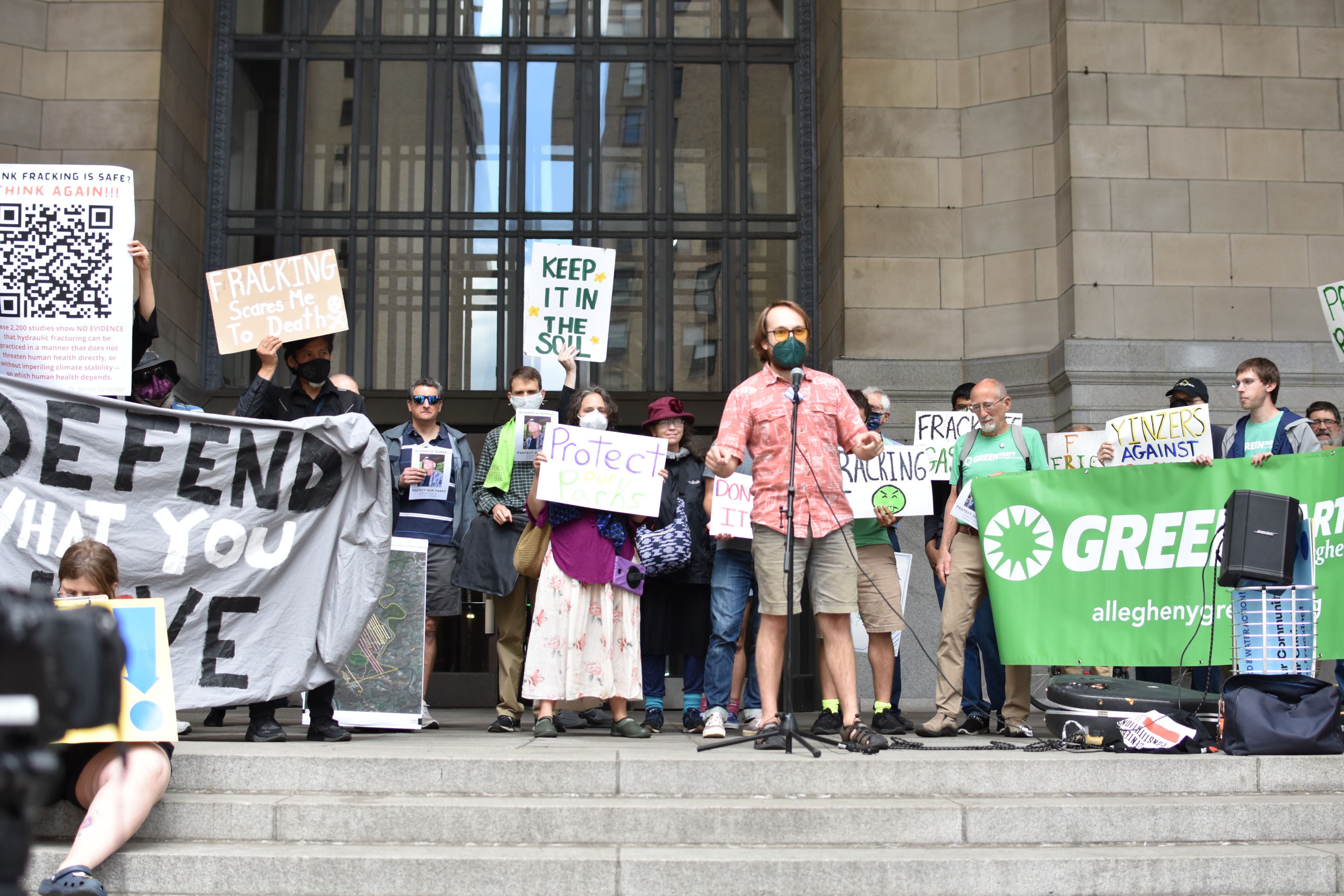
PennEnvironment’s Zach Barber speaks at a rally to ban fracking in Allegheny County ParksPhoto by TPIN | TPIN
Started on staff: 1994 B.A., University of Wisconsin-Madison As executive director, David spearheads the issue advocacy, civic engagement campaigns, and long-term organizational building for PennEnvironment. He also oversees PennPIRG and other organizations within The Public Interest Network that are engaged in social change across Pennsylvania. David’s areas of expertise include fracking, global warming, environmental enforcement and litigation, and clean energy and land use policy in Pennsylvania. David has served on the environmental transition teams for Gov. Tom Wolf and Philadelphia Mayor Jim Kenney. Under David’s leadership, PennEnvironment has won the two largest citizen suit penalties in Pennsylvania history against illegal polluters under the federal Clean Water Act and the largest citizen suit penalty under the federal Clean Air Act in state history.
As the deputy director with PennEnvironment, Ashleigh oversees campaigns to protect clean air and clean water in Pennsylvania. She brings more than 15 years of experience in community organizing and government to her work to win policy change and hold decision-makers, agencies and polluters accountable. Most recently, she worked with colleagues and coalition partners to enact a ban on single-use plastic bags in Pittsburgh. Prior to joining PennEnvironment in 2018, Ashleigh served as a chief of staff in Pittsburgh City Council and organized clean air campaigns for Clean Water Action and the Clean Air Task Force. Ashleigh lives in the Pittsburgh region, where she enjoys gardening and engaging with her community.
Started on staff: 2016 B.A., summa cum laude, Tufts University Flora oversees much of PennEnvironment’s climate and grassroots organizing work, directing staff and mobilizing volunteers around the state to fight climate change and promote good clean energy policy in Pennsylvania. Before taking on this role, Flora was a member of Green Corps where she led campaigns to register youth to vote in Arizona and oppose the Dakota Access Pipeline in Iowa. She’s also directed several door to door canvass offices around the state on behalf of PennEnvironment and Work For Progress. Flora lives in Philadelphia where she enjoys long walks around the city, taking in all of the art, food, and parks it has to offer.
Faran works on PennEnvironment’s Zero Waste program, working to reduce plastic waste in Pennsylvania and to protect our parks and open spaces. Faran’s work has included helping to write and pass bans on single-use plastic across Pennsylvania, including in Philadelphia, promoting the Zero Waste PA package of legislation, protecting major conservation laws like the Land and Water Conservation Fund, and publishing the report “Microplastics in Pennsylvania,” which was the result of a project testing more than 50 Pennsylvania waterways for microplastic pollution.
Stephanie helps run PennEnvironment’s Clean Water and Conservation programs, working on campaigns to get lead out of drinking water, defend the Clean Water Act and protect our pollinators. Stephanie lives in Philadelphia, where she enjoys cycling and cooking.
Started on staff: 2016 B.S., Warren Wilson College Zach works to ensure that every Pennsylvanian has clean, healthy air to breathe. He leads our work to clean up industrial air pollution from Pittsburgh's Toxic Ten and rein in other polluters across the Commonwealth. Before taking over this role, Zach has also led work towards a more fair and open democracy, helping to register tens of thousands of underrepresented voters in Pennsylvania and Florida. When not working, Zach enjoys reading, watching Star Trek, and spending time with his cat, Taylor Swift.

